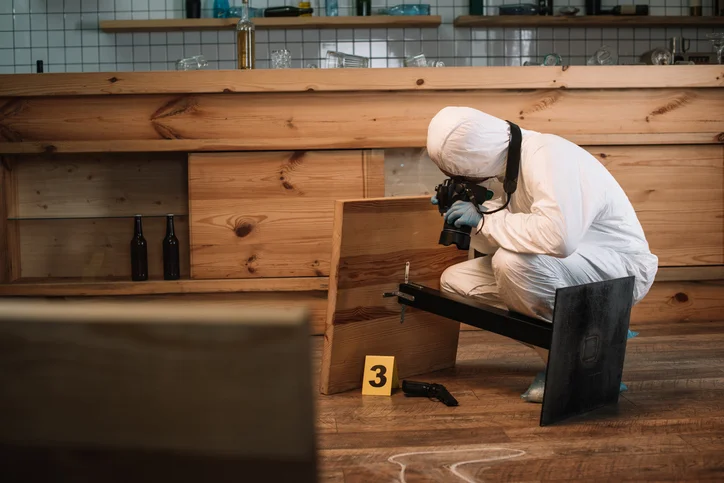What Is a Forensic Investigator and How to Become One

Table of Contents
- What Is a Forensic Investigator?
- How to Become a Forensic Investigator
- Where Do Forensic Investigators Work?
- What Does It Take to Be a Forensic Investigator?
- What is the difference between a Criminal Investigator and a Forensic Investigator?
- Forensic Investigator Job Description Sample
- Forensic Investigator Job Description Sample
What Is a Forensic Investigator?
A forensic investigator is a crime scene investigator (CSI) who collects and analyzes forensic evidence related to a criminal investigation. Their duties include visiting crime scenes and collecting trace evidence such as hair, blood, and fingerprints. Their job is to collect, test, and process forensic evidence accurately so that it can be used in criminal cases.
How to Become a Forensic Investigator
To become a forensic investigator, a type of crime scene investigator (CSI), you need a bachelor’s degree in forensic or natural science and on the job experience. Some police departments and crime labs require a master’s degree in forensic science, biology, criminal justice, or a related field. In these education programs, you study the basics of forensic science, laboratory procedures, and criminal justice to gain skills you need to be successful in this career.
Where Do Forensic Investigators Work?
Forensic investigators, or crime scene investigators (CSI), spend most of their time testing forensic evidence in a lab. They often help collect this evidence from crime scenes. They also spend time in an office writing reports on their findings and documenting procedures. In some cases, they may be needed to testify in criminal court.
What Does It Take to Be a Forensic Investigator?
Forensic investigators need to be able to work collaboratively with law enforcement and other crime scene investigators (CSI). They should follow every protocol for collection and analysis of evidence, so as not to compromise any criminal investigations. Scientific knowledge and attention to detail are important skills in this career. Some investigators choose to gain additional qualifications by pursuing a bachelor’s or master’s degree in forensic science, criminal justice, or a related field.
What is the difference between a Criminal Investigator and a Forensic Investigator?
Forensic Investigator Job Description Sample
With this Forensic Investigator job description sample, you can get a good idea of what employers are looking for when hiring for this position. Remember, every employer is different and each will have unique qualifications when they hire for a Forensic Investigator role.
Job Summary
Job Summary: We are looking for an experienced and detail-oriented Forensic Investigator to join our team. This role will be responsible for conducting comprehensive investigations into financial and legal matters, analyzing evidence, and providing expert testimony in court. The Forensic Investigator must be able to remain objective and discerning while conducting investigations and be able to communicate effectively.
Duties and Responsibilities
- Conduct investigations into financial, legal, and other matters to uncover evidence and provide expert testimony in court
- Analyze evidence, including documents and electronic data, to identify and assess its relevance
- Collect, analyze, and interpret data to determine patterns and trends
- Prepare detailed, accurate, and comprehensive reports on investigations
- Present findings in court, provide expert testimony and answer questions posed by legal teams
- Collaborate with other law enforcement agencies and legal professionals to share information and coordinate investigations
- Maintain strict confidentiality and professionalism in all interactions
Requirements and Qualifications
- Bachelor’s degree in Forensic Science or related field
- Previous experience in a forensic investigator role
- Strong analytical and investigative skills
- Excellent written and verbal communication skills
- Detail-oriented, organized, and able to manage multiple tasks
- Able to remain objective and discerning while conducting investigations
- Knowledge of legal procedures and requirements
- Able to work independently and as part of a team
Forensic Investigator Job Description Sample
With this Forensic Investigator job description sample, you can get a good idea of what employers are looking for when hiring for this position. Remember, every employer is different and each will have unique qualifications when they hire for a Forensic Investigator role.
Job Summary
Job Summary: We are looking for an experienced and detail-oriented Forensic Investigator to join our team. This role will be responsible for conducting comprehensive investigations into financial and legal matters, analyzing evidence, and providing expert testimony in court. The Forensic Investigator must be able to remain objective and discerning while conducting investigations and be able to communicate effectively.
Duties and Responsibilities
- Conduct investigations into financial, legal, and other matters to uncover evidence and provide expert testimony in court
- Analyze evidence, including documents and electronic data, to identify and assess its relevance
- Collect, analyze, and interpret data to determine patterns and trends
- Prepare detailed, accurate, and comprehensive reports on investigations
- Present findings in court, provide expert testimony and answer questions posed by legal teams
- Collaborate with other law enforcement agencies and legal professionals to share information and coordinate investigations
- Maintain strict confidentiality and professionalism in all interactions
Requirements and Qualifications
- Bachelor’s degree in Forensic Science or related field
- Previous experience in a forensic investigator role
- Strong analytical and investigative skills
- Excellent written and verbal communication skills
- Detail-oriented, organized, and able to manage multiple tasks
- Able to remain objective and discerning while conducting investigations
- Knowledge of legal procedures and requirements
- Able to work independently and as part of a team